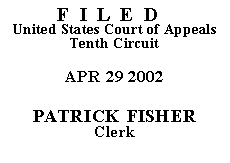

| GARY HERMAN FUGATE,
v.
WARDEN ATHERTON; ATTORNEY
GENERAL OF THE STATE OF
COLORADO |
|
Mr. Fugate was convicted on four counts of armed robbery in state court on April 9, 1990 and received a twenty-four year suspended sentence. On July 9, 1992, however, Mr. Fugate was sentenced to twenty-four years imprisonment after conviction for a probation violation. According to Mr. Fugate, during the 1990 sentencing hearing the trial court informed him, and his defense counsel confirmed, that he had no right to appeal his sentence. In 1994, Mr. Fugate sought post-conviction relief in the Colorado courts but was denied. Mr. Fugate alleges that in December of 1999, a friend informed him that the trial court had erred in stating he had no right to appeal, so he then filed a direct appeal in the Colorado Court of Appeals which denied his appeal as untimely. The Colorado Supreme Court denied his subsequent petition for a writ of certiorari on September 5, 2000.
Mr. Fugate then filed his federal habeas petition, claiming the trial court sentenced him incorrectly and that he received ineffective assistance of counsel. The district court referred the case to a magistrate judge, who issued an order to show cause why the petition should not be denied pursuant to the one-year statute of limitations in 28 U.S.C. § 2244(d)(1). After receiving Mr. Fugate's response, the district court denied the petition as time-barred under § 2244(d)(1).
We initially remanded Mr. Fugate's appeal to the district court for consideration of his timely Fed. R. App. P. 4(a)(5) motion for an extension of time to appeal. In a January 22, 2002 order, the district court granted Mr. Fugate's Rule 4(a)(5) motion. Although Mr. Fugate filed his notice of appeal before the district court granted his Rule 4(a)(5) motion, we have jurisdiction over this appeal. See Hinton v. City of Elwood, Kan., 997 F.2d 774, 778 (10th Cir. 1993) (stating that "Rule 4(a)(5) permits the district court's approval of a timely motion to extend to validate a prior notice of appeal"). In this appeal, Mr. Fugate again raises the allegations that the state trial court sentenced him incorrectly and that he received ineffective assistance of counsel, and also adds allegations that the state trial court violated his Equal Protection and Due Process rights by informing him that he could not appeal his conviction.
Although the district court noted that Mr. Fugate's petition was filed on March 28, 2001, it assumed that he had filed it on February 14, 2001, the date of Mr. Fugate's signature on the petition. Because Mr. Fugate's conviction became final before April 24, 1996, the district court presumed that the petition should have been filed prior to April 24, 1997, one year after the effective date of § 2244(d)(1). See Miller v. Marr, 141 F.3d 976, 977 (10th Cir. 1998). Even given this grace period, however, the district court determined correctly that Mr. Fugate filed his petition well beyond the April 23, 1997 deadline. Although the district court did not analyze whether equitable tolling might apply in this case, see id. at 978 (discussing the possible circumstances that might merit equitable tolling), Mr. Fugate has clearly failed to make a claim of actual innocence or an adequate showing of an impediment to his ability to bring his petition in federal court. See United States v. Sandia, 188 F.3d 1215, 121718 (10th Cir. 1999) (stating that the court of appeals may affirm the district court on any grounds for which a sufficient record is present). Mr. Fugate's vague and conclusory claims that the trial court and his counsel prevented him from taking a direct appeal do not constitute an "extraordinary circumstance" meriting equitable tolling.
Accordingly we DENY Petitioner's request for a COA, DENY Petitioner's request to proceed in forma pauperis, DENY all remaining pending motions, and DISMISS his appeal.
Entered for the Court
Paul J. Kelly, Jr.
Circuit Judge
*. This order and judgment is not binding precedent, except under the doctrines of law of the case, res judicata, and collateral estoppel. This court generally disfavors the citation of orders and judgments; nevertheless, an order and judgment may be cited under the terms and conditions of 10th Cir. R. 36.3.
2. After examining the briefs and the appellate record, this three-judge panel has determined unanimously that oral argument would not be of material assistance in the determination of this appeal. See Fed. R. App. P. 34(a); 10th Cir. R. 34.1(G). The cause is therefore ordered submitted without oral argument.